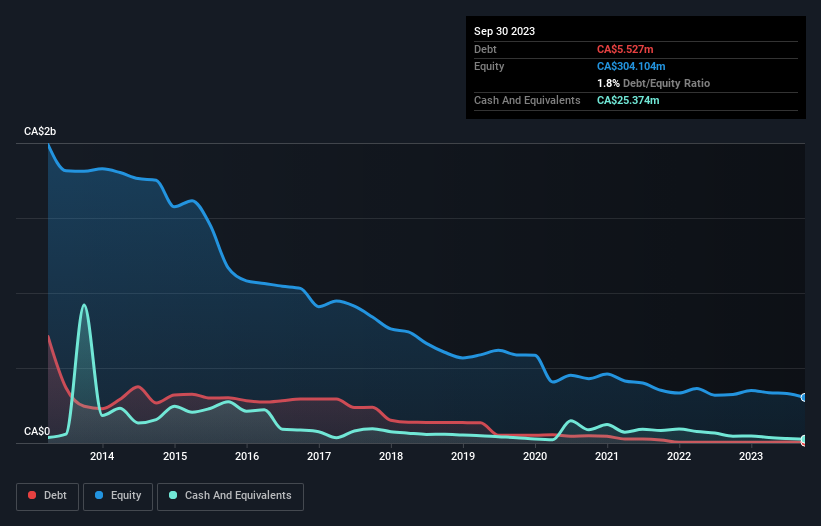Warren Buffett famously said, 'Volatility is far from synonymous with risk.' So it might be obvious that you need to consider debt, when you think about how risky any given stock is, because too much debt can sink a company. We can see that Dundee Corporation (TSE:DC.A) does use debt in its business. But the real question is whether this debt is making the company risky.
What Risk Does Debt Bring?
Debt is a tool to help businesses grow, but if a business is incapable of paying off its lenders, then it exists at their mercy. In the worst case scenario, a company can go bankrupt if it cannot pay its creditors. However, a more usual (but still expensive) situation is where a company must dilute shareholders at a cheap share price simply to get debt under control. Of course, the upside of debt is that it often represents cheap capital, especially when it replaces dilution in a company with the ability to reinvest at high rates of return. When we think about a company's use of debt, we first look at cash and debt together.
See our latest analysis for Dundee
How Much Debt Does Dundee Carry?
As you can see below, Dundee had CA$5.53m of debt, at September 2023, which is about the same as the year before. You can click the chart for greater detail. However, it does have CA$25.4m in cash offsetting this, leading to net cash of CA$19.8m.

A Look At Dundee's Liabilities
Zooming in on the latest balance sheet data, we can see that Dundee had liabilities of CA$9.05m due within 12 months and liabilities of CA$7.65m due beyond that. Offsetting this, it had CA$25.4m in cash and CA$3.57m in receivables that were due within 12 months. So it can boast CA$12.2m more liquid assets than total liabilities.
This surplus suggests that Dundee is using debt in a way that is appears to be both safe and conservative. Because it has plenty of assets, it is unlikely to have trouble with its lenders. Succinctly put, Dundee boasts net cash, so it's fair to say it does not have a heavy debt load! There's no doubt that we learn most about debt from the balance sheet. But it is Dundee's earnings that will influence how the balance sheet holds up in the future. So when considering debt, it's definitely worth looking at the earnings trend. Click here for an interactive snapshot.
In the last year Dundee wasn't profitable at an EBIT level, but managed to grow its revenue by 250%, to CA$8.3m. That's virtually the hole-in-one of revenue growth!
So How Risky Is Dundee?
Statistically speaking companies that lose money are riskier than those that make money. And the fact is that over the last twelve months Dundee lost money at the earnings before interest and tax (EBIT) line. And over the same period it saw negative free cash outflow of CA$17m and booked a CA$7.6m accounting loss. However, it has net cash of CA$19.8m, so it has a bit of time before it will need more capital. The good news for shareholders is that Dundee has dazzling revenue growth, so there's a very good chance it can boost its free cash flow in the years to come. High growth pre-profit companies may well be risky, but they can also offer great rewards. When analysing debt levels, the balance sheet is the obvious place to start. However, not all investment risk resides within the balance sheet - far from it. For example - Dundee has 1 warning sign we think you should be aware of.
At the end of the day, it's often better to focus on companies that are free from net debt. You can access our special list of such companies (all with a track record of profit growth). It's free.
New: Manage All Your Stock Portfolios in One Place
We've created the ultimate portfolio companion for stock investors, and it's free.
• Connect an unlimited number of Portfolios and see your total in one currency
• Be alerted to new Warning Signs or Risks via email or mobile
• Track the Fair Value of your stocks
Have feedback on this article? Concerned about the content? Get in touch with us directly. Alternatively, email editorial-team (at) simplywallst.com.
This article by Simply Wall St is general in nature. We provide commentary based on historical data and analyst forecasts only using an unbiased methodology and our articles are not intended to be financial advice. It does not constitute a recommendation to buy or sell any stock, and does not take account of your objectives, or your financial situation. We aim to bring you long-term focused analysis driven by fundamental data. Note that our analysis may not factor in the latest price-sensitive company announcements or qualitative material. Simply Wall St has no position in any stocks mentioned.
About TSX:DC.A
Dundee
Through its operating subsidiaries, the firm is engaged in diverse business activities in the areas of investment advisory, corporate finance, energy, resources, agriculture, real estate and infrastructure.
Solid track record with adequate balance sheet.
Similar Companies
Market Insights
Weekly Picks


Crazy Undervalued 42 Baggers Silver Play (Active & Running Mine)


Fiducian: Compliance Clouds or Value Opportunity?

Willamette Valley Vineyards (WVVI): Not-So-Great Value
Recently Updated Narratives

PRME remains a long shot but publication in the New England Journal of Medicine helps.

This one is all about the tax benefits

Estimated Share Price is $79.54 using the Buffett Value Calculation
Popular Narratives


MicroVision will explode future revenue by 380.37% with a vision towards success


NVDA: Expanding AI Demand Will Drive Major Data Center Investments Through 2026




